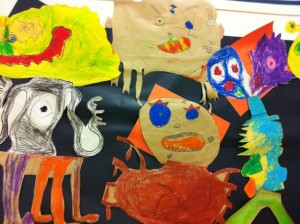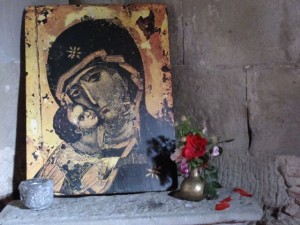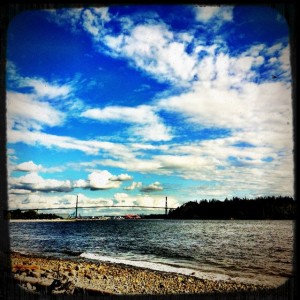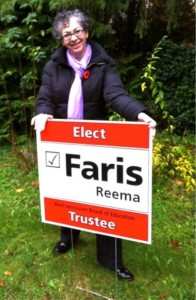Posts Tagged ‘public education’
A Question of Size
“We may not be big but we’re small!”
As CBC radio listeners know, that’s the motto of the Vinyl Café, the vinyl record store at the heart of Stuart McLean’s storytelling series.
I think the motto counterbalances another common theme of our times: “Bigger is Better”. A concept which often leads to trouble economically, politically, and environmentally.
The Vinyl Café motto is also a good fit for Lions Bay Community School, a primary school in School District 45 which enrolls approximately 60 students per year in kindergarten to Grade 3. A privately run preschool also operates on the premises.
In June, I attended the school’s leave-taking ceremony for its Grade 3s, a ceremony which marks their “graduation” and acknowledges their future status as intermediate students at other schools starting in September.
Lions Bay, it seems to me, is so big in what it does even though it is small.
Why?
Part of it is the setting. Nestled in the forest, the school seems to be swimming in an ocean of green.
Part of it is the architecture. Now over 30 years old, the school is built on an open-concept plan which allows an unparalleled flow between learning spaces and allows the teaching staff an exceptional amount of flexibility.
Part of it is the community. Families who choose to live in Lions Bay have made a specific lifestyle choice and they are active participants in the school because it is a major focus for the community.
There are challenges, too. Because it is so highly dependent on area demographics, enrollment at the school can only be maintained as long as there are young families in the area or willing longer-distance commuters (for example, if Squamish families or Horseshoe Bay residents were to choose the school for their children).
In addition to the excellent teaching staff, the supportive community, and the outstanding physical environment, size is something else that gives Lions Bay an edge. Being small helps the school fulfill its mission statement “to provide a safe learning environment and strive to enable students to become confident learners”.
The size of the school, in my opinion, keeps the student experience at the heart of operations by allowing a higher degree of personal attention. It has also sparked innovation in pedagogical approaches.
These factors have all combined to ensure success for these young students.
Being small can be effective.
Which brings me to the measures being taken to restructure the bargaining framework in BC’s public education system. Measures which I hope are not a prelude to regionalizing or eliminating Boards of Education.
As John Abbott, President of the 21st Century Learning Initiative, cautioned during a visit to West Vancouver earlier this year, losing local governance puts the future of learners at risk by distancing the local community from decision-making.
So here’s what I hope our provincial government and the leadership of BCSTA remember as they work together during the remaining days of summer.
Bigger is not always better.
Artwork by Lions Bay students on display in the gym.
The Tracks Of Her Tears
I saw the mother of a young man cry last week.
Her tears weren’t tears of grief and loss.
Rather, the tracks of her tears captured a story of love, bewilderment, perseverance, disappointment, faith, despair, relief, pride, and thankfulness.
Why?
Her son had graduated.
Such a pedestrian sound to this accomplishment: her son had graduated.
But it’s only pedestrian because high school graduation has become an expected (minimal) norm in our world.
However, it’s a mistake to assume high school graduation is automatic even in a community such as West Vancouver which boasts a 97% graduation rate.
There’s the perception that all the children in this community will make it, that they all have an easy ride.
Wrong.
It’s a mistake to assume that the glittering mantle of expensive housing, disposable income, and stable family is the reality for each child. It’s wrong to assume they will thrive in our high schools.
That’s why we have ACCESS.
Located at West Vancouver Secondary School, ACCESS
“… is an alternate school program designed to provide an opportunity for students who require this unique setting to complete the requirements for high school graduation.
In addition to the basic academic program, ACCESS also provides students with the following opportunities.
- 10 day Bowron Lakes wilderness experience
- Participate in various local outdoor activities
- Access to community youth services
- Work experience
- Apprenticeship
Admission is through an interview process…”
The ACCESS grad luncheon this past week was an opportunity to recognize the accomplishments of remarkable young people who had done what is expected of many, but which was not a guaranteed outcome for them.
And in a society which increasingly favours conformity and compliance, they did so while holding on to their unique forms of self-expression, their standout personalities, and saying “I’ll do what you ask, but I’m doing it my way”.
That is strength of character, courage, and conviction.
At ACCESS collaboration is a lifeline. There’s a dedicated team of teachers and youth workers who guide these students and who are joined by representatives from community partners such as the District of West Vancouver Community Services, the West Vancouver Police Department, Vancouver Coastal Health, the Ambleside Youth Centre, and local businesses.
In hindsight, maybe the tears of that young man’s mother did denote loss of a kind. They reflected the grief she’s carried with her knowing her son’s journey has been immeasurably tougher than many of his peers.
But there was more in her eyes.
There was joy. Despite the obstacles, her son had reached this milestone and was publicly recognized for doing so.
There was hope. Hope that it was, after all, going to be fine.
What more could I ask for than to be associated with a system which provides joy and hope to those who are at risk and vulnerable?
A system that is not taken in by the appearance of the community’s “perfection”, but which understands that unless our “diamonds in the rough” have a place to call their own, then our claims of excellence will ring hollow.
To The Graduating Class of 2013
My remarks to the Sentinel Secondary School graduating class of 2013. Another version of this presentation was delivered to the Rockridge graduating class on May 17, 2013. This is a full transcript of my words and as is typical with verbal presentations, adjustments and/or changes may have been made while speaking.
Thank you. Merci.
I’m so pleased to be here tonight. Je suis très heureuse d’être ici avec vous ce soir.
On behalf of the West Van Board of Education, my congratulations to all this year’s graduates. Félicitations!
I know many of you are wondering who is this talking head and why does she get to speak at my grad?
Well, in the November 2011 municipal elections I and four others were elected by West Van residents to serve as Trustees on the Board of Education.
That means my colleagues and I help to oversee the public education system in our community and that along with your teachers, the staff at the school and the district, parents and yourselves, we have a measure of responsibility and accountability for your education from kindergarten through to Grade 12.
I also happen to be a graduate of school district 45.
Even though I’ve been around the District on and off since I was twelve, and even though I’ve been to Sentinel a number of times, I wanted to get a better feel for the school and its students before I spoke tonight.
I phoned up Principal Mike Finch and asked if we could tour the school together. And we did. I got to see some of you at work and some of you at play. I had a look into many of the classrooms and then I asked Mr. Finch to tell me about you, to tell me about students at Sentinel.
I’m just gonna give you a moment to think about what he told me.
No, he didn’t say that. Oh, he’d never say that, would he? No way. Uhuh.
What he did tell me is how impressed he has been by the students at Sentinel. How dedicated you are and how motivated you are to succeed on your own terms whether you’re studying French, pursuing your athletic interests in the academies, or being super achievers.
Barb Sunday, one of your amazing art leaders told me during my visit to the school, that she’d sent off about 50 advanced placement art portfolios for consideration. 50! And if you stop by the Ferry Building Gallery at the foot of 14th Street, you’ll see some of that art on display.
What you’ll also see there is the commitment you’ve made to pursuing your passions and the care you’ve taken to excel in the work you do.
And tonight we’re here to celebrate your accomplishments.
For parents, it’s a bittersweet moment, likely tinged with a sense of relief! Tonight is a chance to celebrate the wonderful individuals you’ve become and yet we also have to be prepared to let you go.
That’s what parents do.
And like parents, the teachers, the administration, and all the staff of the West Van school district – even Trustees, we all have to do our best to make sure you grads have the skills and talents you need to continue to succeed. And now you’re moving on.
But it’s not easy as parents or teachers or administrators to let you go because we know that the journey can sometimes be a challenge.
I would like to share with you some words by the Lebanese poet Kahlil Gibran. In his poem on children, he writes:
Your children are not your children.
They are the sons and daughters of Life’s longing for itself.
They come through you but not from you,
And though they are with you yet they belong not to you.
You may give them your love but not your thoughts,
For they have their own thoughts.
You may house their bodies but not their souls,
For their souls dwell in the house of tomorrow, which you cannot visit, not even in your dreams.
As Gibran says, you, our graduates, you live in tomorrow and we are not here to stand in your way.
You’ve worked hard or maybe you haven’t. You’ve had good days and bad. You’ve made friends, you’ve lost friends. You’ve studied, you’ve learned. You’ve been on a journey and now you’re set for the next stage of life whatever that may be for you.
And what do you need to successfully navigate what’s ahead?
To borrow the words of Canadian musicians David Myles and Classified, you need to embrace your inner ninja.
Be fierce and determined and passionate. Dream big and take action.
Stand up for yourself. More importantly, stand up for others.
Stand up for what you believe. More importantly, be tolerant and allow others to speak up for what they believe.
Stand up for what is right. More importantly, be open to different views and adjust your ideas if warranted.
And finally, Sentinel grads, take all that we — the community, the school District, the administration, your teachers, and your parents — take all that we have given you, take all that you are, and make the world you are inheriting, make it better.
Make the world better for you, for me, and for those who have so much less than either of us.
I know you can do it. I know you can do it.
Thank you and bonne chance!
Year One Retrospective
A year ago, I was elected as a Trustee to the West Vancouver Board of Education and it’s been an honour to work on behalf of this community. I’ve lived most of my life here, I’m a graduate of the school district in which I now play a role, and I’m fortunate I’m able to raise my child here.
As a public education community, we’re very lucky in West Vancouver. We have a great administrative team, we have inspiring leadership from our Superintendent, we have incredible staff, we have a caring Board, and we have a cadre of educators who are diligent, dedicated, and determined to deliver the highest quality teaching and learning.
We’re also favoured in that our community highly values education and families here generally have the means to ensure the best for their children. And yet, even with all these advantages, I see any number of troubling issues which appear to characterize the public education system in British Columbia.
And so, when I’m asked about my experience as a Trustee, my inclination is to say that the system is more complex and complicated than I realized despite having been an active parent-volunteer for five years before choosing to run for office.
Why?
In part, I think, because there are many different interpretations of the generally agreed upon underlying principle which I see as “the best interest of the child”.
Is the core purpose of education the success of the individual child or is it the betterment of society? Do parents know what’s best for their child or do teachers? Is an educator an autonomous professional or an expert member of a team?
I’m sure any one of us could generate an endless list of questions on the big picture of education, but then there are the practicalities. How is the provincial government able to show that funding per pupil is at an all time high while school districts have to nip, tuck, or cut programs and services in order to balance budgets? Given that 80% of a school district’s budget is consumed by salaries and benefits, how can innovative projects be implemented when resources are so constrained? How can infrastructure be maintained and new capital projects be contemplated with no additional funding?
Despite the seemingly intractable challenges, there’s no doubt in my mind that we have to do everything we can to foster dialogue on this issue. That education needs to be made the highest priority in this province, that we have to find a way to work collaboratively to make our strong system better.
The reason is simple. Education is the path to a more just and more equitable world.
And while it may be difficult to hold on to this truth given the evidence of the harm humans continue to do to the earth and to each other, it is why I remain committed to doing the best I can, for public education, in the remaining two years of my term.
The Arts In Education – For A Better World
What a relief! Mark Mercer’s article in this morning’s newspaper reiterated that “universities are about education, about learning for the sake of learning” and that “university done rightly is great preparation for life”.
This was a welcome contrast to Margaret Wente’s recent diatribe against the Occupy protesters. With a swipe of her pen, she denigrates the value of the humanities. She seemingly fails to recognize that there are likely as many mechanical engineers out of work today as there are sociology students trying to find their way in life.
The business challenges we face and the deficiency in employment opportunities for young adults is not due to the educations they pursue; rather it reflects the reality of the structural weaknesses and flaws in our economies and societies.
And while we struggle to address these serious questions, as educators we need to ensure that we don’t lose sight of the value of the humanities in education and the value of the arts in our students lives.
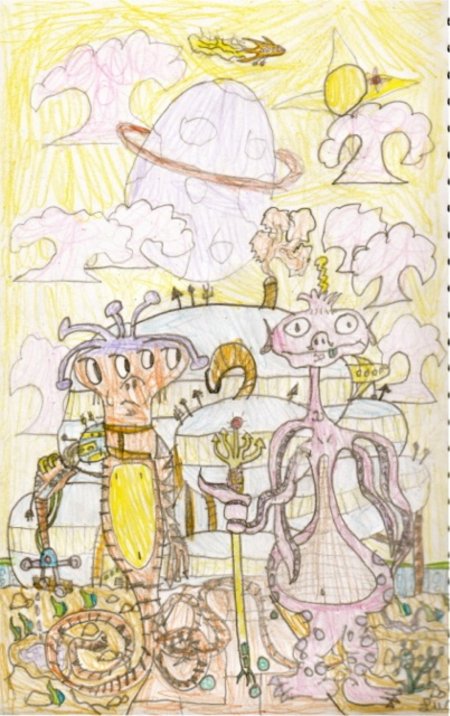 When I walk down the hallways at my son’s school, I’m always struck by the amazing artwork the students produce: artwork directly related to the curriculum, the topics they are studying, and their learning. A lot does get done and I think that a lot more needs to be done to without imposing a further burden of delivery on teachers.
When I walk down the hallways at my son’s school, I’m always struck by the amazing artwork the students produce: artwork directly related to the curriculum, the topics they are studying, and their learning. A lot does get done and I think that a lot more needs to be done to without imposing a further burden of delivery on teachers.
What if in-residence programs were implemented? For example, what if a published author served as writer-in-residence for the district? We have great visual artists on the North Shore — why can’t we look at having them conduct classes or organize field trips to their home studios throughout the year? Why can’t a professional dancer come in on an extended basis, once a week, to help choreograph a holiday show? Could we organize visits to Sinfonia’s (the North Shore’s professional orchestra) rehearsals? Why isn’t it automatically on the calendar every September and October for classes to take in sessions offered during the Vancouver International Writers Festival or Vancouver International Film Festival?
Some schools may be pursuing these sorts of projects and some schools aren’t. These type of initiatives, in my mind, would compliment teachers’ efforts and would be most viable in conjunction with greater support for specialist teachers (music, art, drama, dance, etc.) already hard at work. I also see that such programs would be most economically effective if delivered on a resource-sharing model between the district, the schools, and the Parent Advisory Councils (PACs).
I’m not advocating a specific approach or model because I don’t have all the information necessary to say which one will work the best. What I do know is that there is room to do more, much more. And we must do more because the arts, to me, are integral to the human experience and our children’s learning will be enhanced if art is more fully-integrated in their daily routines as a central component rather than as simply an adjunct.
I agree with Martha C. Nussbaum who writes in her 2010 book Not For Profit – Why Democracy Needs the Humanities:
“If we do not insist on the crucial importance of the humanities and the arts, they will drop away, because they do not make money. They only do what is much more precious than that, make a world that is worth living in, people who are able to see other human beings as full people, with thoughts and feelings of their own that deserve respect and empathy, and nations that are able to overcome fear and suspicion in favor of sympathetic and reasoned debate.”
I think there’s room to dispute her contention that the arts do not make money (look at this recent article by John Doyle on the profits made by private television broadcasters), but the point is that there is inherent value in the arts and humanities which we risk losing in a world solely focused on measurable utility and on money.
And isn’t that the ultimate purpose of education, as Nussbaum says, to “make a world that is worth living in, people who are able to see other human beings as full people”?
So let’s do that. Let’s make sure that our curricula do not sacrifice the arts. Let’s not make this a lesser world, but a better one.
